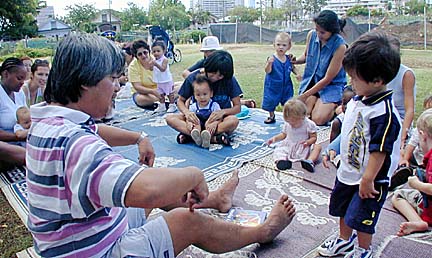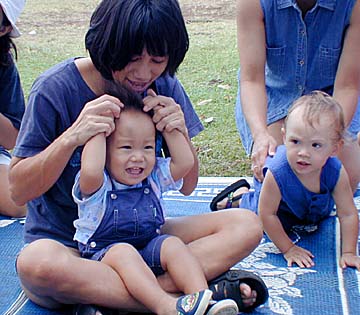


Preschool If parents can't send their children to preschool, The Institute for Family Enrichment may bring a preschool to them.
on wheels
Isolated kids find a
haven in the schoolBACK TO SCHOOL
Treena Shapiro / tshapiro@starbulletin.com
The organization's mobile outreach program -- a preschool on wheels -- targets isolated, homeless and potentially high-risk families with young children, providing educational activities and developmental screening, as well as classes and referrals for parents.
To the kids, it's just a play group with "Uncle John."
John Nishimoto, 50, leads the traveling preschool, spreading out toys, books and art supplies before getting down on the ground to draw, sing and play with the children.
Meanwhile, community liaison Linda Susan Madamba works with the parents, checking on their children's development and providing referrals for early intervention programs for children who need additional health, nutrition and educational screening.

During the school year, the play mornings are held at Wahiawa District Park on Mondays, Makiki District Park on Tuesdays, Loliana Family Shelter in Kakaako on Wednesdays, Maililand Transitional Housing on Thursdays and the Weinberg Village in Waimanalo on Fridays.Over the summer, when the parks are taken over by Summer Fun programs, Nishimoto leads the Educational Building Blocks program, which helps prepare 4-year-olds in transitional housing for kindergarten.
At the Loliana Family Shelter, about two dozen children congregated at the building's playground when the play mornings resumed last month. "The kids like it. They love coming here," said Holly Vasquez, a single mother with a daughter, 2, and a son, 4.
She is not just paying lip service. Vasquez and her children had just moved out of the Loliana shelter to their own home in Aiea, but caught the bus back to Kakaako for the play morning. "It's worth it," she said. "They get to see all their friends."
Among her son's friends was a 3-year-old boy having his first-ever birthday party. The birthday boy's 45-year-old mother, a graduate student at the University of Hawaii who asked to be called "Kupu," said the two boys were close friends.
"That's one of the sad things about this place (the transitional shelter)," she said. "They leave. It is sad for the ones left behind."
Constants like the Keiki Play Morning help.
"John (Nishimoto) is terrific," she said, noting that raising her son alone means he does not see other men often. "There's no other male influence in his life. He really likes to come to the play group, especially to see John."
In addition to everything else he learns, like how to socialize and share with other children, "he learns what it's like to be with a male," Kupu said.
Nishimoto, who has two children of his own, said he likes being able to provide a male presence for the children. "There aren't that many men in the field, so it's not that unusual (for the children to become attached)," he said. "It's nice. I think I can show them a different side sometimes."
The Institute for Family Enrichment's co-owner and founder Barbara Naki said the mobile outreach program -- which originally started to reduce the isolation of military families living on base -- serves between 850 and 900 families, although it is contracted by the Department of Health Maternal and Child Health Branch to serve only 400.
Program administrator Bob Raasche said they "just have to bite the bullet" to serve the additional families. The institute receives roughly $250,000 a year to fund its mobile outreach programs throughout the state.
Raasche said he does not like the idea of setting a cap on participation, and the doors remain open despite strained resources. "You learn to teach them how to share their toys and how to share things and how to get along, and it just works," he said.
Naki said the institute has had to stop some programs benefiting the general population, however, and while two mornings a week are still open to everyone, focus has shifted to homeless families. Among the families living in transitional housing, "there's a risk for the family for mental health issues, abuse, abandonment," Naki said.
Therefore, the institute offers parenting courses for homeless parents, and the Keiki Play Mornings provide a place for them to try what they've learned.
With so many demands being placed on parents, the mobile outreach programs give families a sense of stability, Naki said.
"It's a nurturing but safe place," she said. "You can be yourself and not be kicked out or judged."
Poverty rates in Hawaii and the mainland, according to Census 2000: Picture of poverty
Hawaii
All families 7% Families headed by single mother 20% Related children under age 18 12% People age 65 and older 7%
United States
All families 10% Families headed by single mother 27% Related children under age 18 17% People age 65 and older 11% Source: U.S. Census Bureau, Census 2000 Supplementary Survey